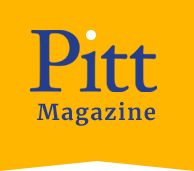
Martha Mantilla’s interests in books and culture moved her from her roots in Colombia to destinations all around the world, and eventually to a long career as the librarian of the Eduardo Lozano Latin American Collection at the University of Pittsburgh.
Born in Bogotá, Mantilla grew up alongside an older sister and a younger brother. Early on, she was drawn to education and different cultures. She studied primary and secondary education at Colegio Santa Clara in the capital city, then trained for a year in librarianship at La Biblioteca Luis Ángel Arango, Colombia’s second-largest library.
“Undoubtedly, attending this program was the base for my love and passion” for libraries, she says, and a pathway to her current position.
When she finished the training at Luis Ángel Arango, Mantilla received a scholarship to study library science at Pitt.
Before she left for the United States, Mantilla contacted Pitt’s Center for Latin American Studies for help finding a roommate. The center connected her with Susan Smith (EDUC ’87G), who remains a good friend.
The semester before classes began, Mantilla enrolled in the English Language Institute (ELI) at Pitt. Although she and Smith both spoke Spanish, they restricted their conversations to English as a way to help Mantilla practice to pass the Test of English as a Foreign Language.
When she was done, Mantilla began the master’s in library science at Pitt, which she completed in 1987 along with earning the Graduate Certificate in Latin American Studies from Pitt’s Center for Latin American Studies.
As part of her graduate school experience, in fall 1986, Mantilla was hired as an assistant librarian for the Institute for Shipboard Education’s Semester at Sea. She traveled all over the world, with stops in Kobe, Japan; Busan, South Korea; Keelung, Taiwan; Hong Kong; Mumbai, India; Istanbul and others. Nearly 20 years later, she participated in Semester at Sea again, but this time as the main librarian.
Mantilla also earned her PhD in administrative and policy studies from the School of Education in 2002. Her dissertation was on the primary school system of rural Guatemala.
Since she’s been in Pittsburgh, Mantilla has also held community and academic roles that have allowed her to teach and share Latin American history and culture. She worked for a time as a librarian at Carlow University. Later, while working full-time at Pitt, she hosted Barrio Latino at WRCT, an independent radio station at Carnegie Mellon University. For almost 10 years, she broadcasted Latin American music and news and interviewed students, professors, artists and others on Latin American arts, music, politics and more.
In 2003, she collaborated with Pitt students to create Amigos del Cine Latino Americano, a program that showcased Latin American films and directors, such as Argentinian screenwriter and politician Fernando Ezequiel Pino Solanas.
All of these experiences opened doors and led Mantilla to the position of assistant to Pitt’s librarian for Latin American studies.
At the time, the role was held by Eduardo Lozano, whom she described as having a “very clear vision about the world.” Because of his constant interactions with students and professors, his broad knowledge about humanitarianism and his skills in library science and management, Lozano created the robust collection devoted to Latin America, which now bears his name. Lozano served as a mentor to Mantilla for 15 years before he died in 2006.
In 2007, Mantilla became the librarian of the collection.
Mantilla says the Latin American community in Pittsburgh has grown significantly since her arrival almost four decades ago — U.S. Census figures report about 11,000 Hispanic people lived in Allegheny County in 2010, compared to more than 47,000 today. Along with improved immigration and health care services, she believes the archival materials of the Eduardo Lozano Latin American Collection has also attracted more Latin American students to Pittsburgh because its “unique materials are for the most part not found in other libraries,” she says, “and this increases the archives value … intellectually.”
The collection includes materials from some of the most renowned Latin American figures in history, including microfilms, microfiche, films and videos, print and electronic materials produced by literary authors, philosophers, historians, musicologists — all kinds of people of different nationalities and backgrounds.
For Mantilla, some of the most relevant pieces in the collection are those that “speak to anyone.” She cites as one of her favorites a collection of more than 900 postcards from the 19th century from multiple countries in Latin America. This special collection portrays the sharing of moments from everyday life, showing how people took the time to carefully write to loved ones without even expecting a return notice for days or weeks.
Other special collections
Daniel Balderston, director of the Borges Center at Pitt, has helped ULS acquire rare and unique materials by Argentinian literary figure Jorge Luis Borges. You can find original manuscripts, photographs and some of his articles from the newspaper La Nación in the Archives and Special Collections at Hillman Library.
A scrapbook documenting Nicolas Guillén’s visit to Uruguay holds much of the Afro-Cuban activist’s poetry that earned him recognition as the National Poet of Cuba and a position as one of the Afro-Cuban movement leaders.
The Carmelo Mesa-Lago Archival Collection is named for one of the most important professors in Pitt’s history. It includes academic materials from the Cuban author who published more than 90 books and 300 articles throughout his life, earning the distinction of being a Distinguished Service Professor Emeritus of Economics and Latin American Studies at the University.



